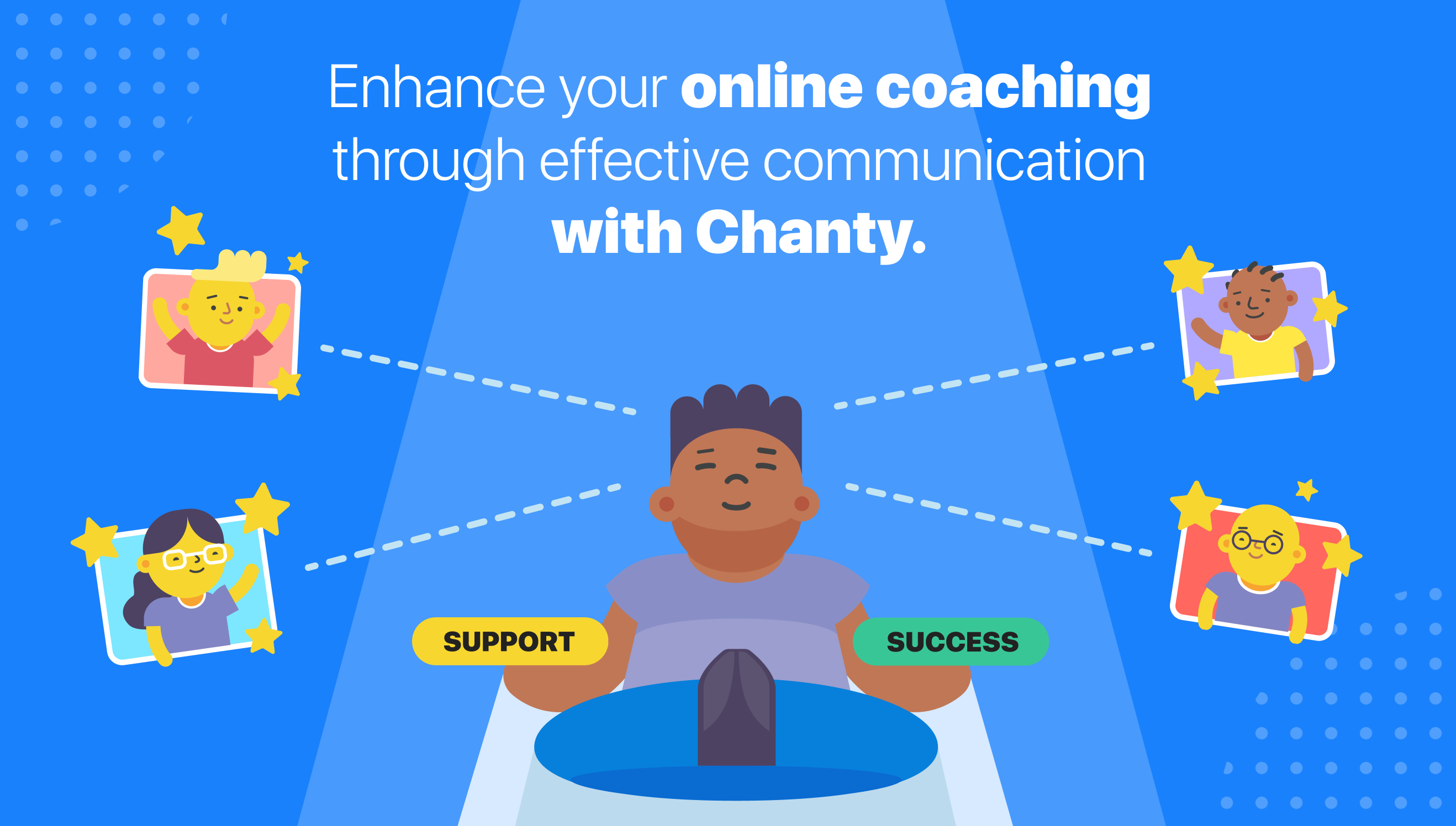In the age of screens and emojis, it’s no wonder that coaching has taken a digital leap. Professional coaching in an online setting is the new talk of the town. And with good communication, you can take it to some great heights!
Gone are the days of face-to-face sessions and awkwardly trying to balance a latte while taking notes. Now, you can coach clients from the comfort of your pajamas, or, let’s be honest, from your favorite pair of fuzzy socks.
Picture this: renowned coaches like Tony Robbins, Robin Sharma, and Rich Litvin have ditched the traditional coaching game and hopped on the digital bandwagon. They’ve traded in their briefcases for laptops and their office walls for virtual backgrounds.
And why not? The professional coaching market is projected to skyrocket to a whopping $4.5 billion by 2028, according to Forbes. It’s like hitting the jackpot but without the flashing lights and cha-ching sounds.
If you are considering venturing into the online coaching world or want to enhance your coaching practice with good communication, this article is for you.
But before we dive into the nitty-gritty, let’s address the elephant in the digital room, shall we?
Unmasking the guru aka professional coach in a digital setting
Now, let’s meet the star of our show: the professional coach. Picture a regular coach, but with a digital twist. They’re like your personal cheerleader and accountability buddy, all rolled into one virtual package. But here’s the kicker – they don’t do the whole “in-person” thing.
Professional coaches have embraced the wonders of the digital era, harnessing the power of video conferencing platforms and online resources to guide their clients toward success. Say goodbye to the days of commuting and hello to the magic of a virtual meeting room. Who needs a stuffy office when you can create your coaching empire from the comfort of your own home?
These tech-savvy gurus work with clients to define their goals, develop actionable plans, and provide the tools and expertise needed to conquer the tasks at hand.
And with good communication as their secret weapon, a professional coach can take the industry by storm. Effective communication skills are the key to their success in unmasking the guru within them and delivering exceptional coaching experiences.
5 types of professional coaching you should know about
Now that we’ve cracked the code on professional coaching, let’s take a whimsical journey through the wonderland of coaching programs. Here are five types of coaching programs that will make your coaching business soar.
1. Executive coaching: where CEOs find their fairy godmother
Online executive coaching is among the most popular programs available for C-suite executives, business owners, and high-level managers. An executive coach helps top-level leaders establish team synergy, train them in problem-solving techniques, deal with change management, and implement new ideas.
2. Sales coaching: turning sales warriors into superstars
Online sales coaching is a skills-oriented coaching program in which a sales expert trains and mentors aspiring sales professionals. With online sales coaching, you’ll embark on a quest to master the art of closing deals and smashing targets. Through mock conversations, role-playing, and invaluable feedback, a sales expert will train and mentor you to engage with clients of all shapes and sizes.
3. Team coaching: unleashing the power of collaboration
Team coaching is a type of online group coaching in which team members learn about collaboration and establish team dynamics through different challenges. If your organization is in need of some harmony and cross-functional magic, team coaching is here to save the day. Together, you’ll break down barriers, build bridges, and create a symphony of success. It’s like a team-building retreat without the trust falls and awkward icebreakers.
4. Holistic health coaching: finding zen in a digital world
In a world full of deadlines, stress, and Zoom fatigue, taking care of your well-being is essential. Enter the realm of online holistic health coaching, where wellness warriors guide you on a journey of self-discovery. These virtual gurus help you focus on your physical, mental, emotional, and spiritual health. Whether you’re seeking work-life balance, better nutrition, or a moment of Zen amidst the chaos, these coaches have got your back. It’s like having your wellness genie ready to grant your wellness wishes.
5. Transformational coaching: from ordinary to extraordinary
Online transformational coaching is one of the most popular types of virtual coaching programs designed for individuals looking to transform their morning motivation, habits, lifestyle, appearance, and personality to find greater fulfillment in life and achieve different professional and personal goals.
The role of communication in setting up professional coaching
Starting a professional coaching business opens up a world of opportunities, allowing you to leverage technology, connect with clients globally, and embrace the flexibility and scalability that the digital landscape provides.
In this chapter, we’ll explore the 11 essential steps on how communication can help you when stepping into professional coaching.
1. Finding your coaching business idea
The first thing you need to do when starting a coaching business is come up with an idea.
Fortunately, you don’t have to do something that’s never been done before. Instead, you can search online for trends in the coaching industry.
Remember, people will pay for your skills and experiences.
So, ask yourself, “What are your strengths?”
For instance, if you’re a successful real estate investor or stock trader, you can coach others looking to venture into the industry using real estate software.
You can also create a short course based on your investing or trading expertise to provide a more complete learning solution.
Role of communication: Effective communication allows you to understand your strengths and identify the skills and experiences you can offer to potential clients. It helps you articulate your ideas clearly and concisely, making it easier for others to understand the value you bring as a coach.
2. Pick your niche
Today, you can find hundreds of coaching business ideas with a simple Google search.
However, you have to follow a formula that works for you. Remember, the purpose of coaching is to help others solve problems or adopt new skills and habits.
So, you need to pick a niche that you’re good at to be successful.
Some of the most popular niches in the market include:
- Life skills (public speaking, emotional intelligence, confidence, etc.)
- Family (household management, relationships, birth coaching, etc.)
- Personal development (career counseling, fitness, etc.)
- Leadership
- Finance
- Marketing and sales
- Digital transformation
- Pet handling
- Spirituality
- Health, etc.
Role of communication: When selecting a niche, good communication enables you to communicate your expertise and specialization effectively. For example, if you’re interested in developing your finances, a student loan debt coach could lend their expertise on topics like how to refinance private student loans or complex financial strategies to attract clients looking for guidance in this area.
It helps you convey to potential clients how your coaching services can address their specific problems or help them develop new skills and habits.
3. Determine your target audience
Once you have an idea and a niche to target, you need to understand who your clients are.
In the beginning, this might be difficult since your coaching services might not appeal to everyone.
However, you should have a good sense of your ideal clients.
The best way to do that is to understand the pain points in your area of expertise.
For example, if you’re a canine behaviorist specializing in handling different dog breeds, your target audience would be owners struggling to handle their dogs.
Role of communication: Understanding your target audience requires effective communication to gather insights into their pain points and challenges. By actively listening and engaging in meaningful conversations, you can tailor your coaching approach to resonate with their needs and aspirations.
4. Establish your coaching model
Source: Canva
Next, you need to determine whether you want to coach clients individually or as a group.
One-on-one sessions will allow you to focus on one client at a time and offer more personalized advice and guidance.
In contrast, group coaching will allow you to coach multiple clients in a single session. More importantly, it will provide clients with the chance to work on their goals together without the need to be physically present at a designated venue.
In other words, you can help them create a sense of community and build accountability from anywhere.
You can prompt clients to stay motivated through continuous social support. Because people are generally more inclined to show up for sessions when they know other members are doing the same.
So, there are fewer chances of them making excuses, especially since they’re potentially just a few taps or clicks away from joining a session via a communication tool like Chanty.
Role of communication: In choosing whether to coach individually or in groups, good communication ensures clear and transparent communication with clients about the benefits and outcomes of each approach. It allows you to set expectations, address any concerns, and foster a sense of community and accountability among group coaching participants.
5. Choose your professional coaching business name
Once you complete the steps above, it’s time to choose a name for your professional coaching business.
This will be the first step you take to create your brand. Most online coaches use their names and put “coaching” or “consulting” at the end.
Using your name also improves search engine rankings, meaning your site or information will likely appear on the first page of results.
Role of communication: Communication plays a significant role in creating a memorable and impactful business name. It helps convey your coaching brand’s essence and positioning to potential clients, making it easier for them to connect with your services.
6. Create your coaching program
Source: Canva
Now that you have a name for your coaching business, you’re all set to create a signature professional coaching program for your clients, encompassing everything from structure to steps and resources.
For instance, if you’re a career coach looking to help clients switch careers, your program should include the following:
- An assessment of current job satisfaction levels and reasons for switching
- A review of your skills, expertise, and experience
- Upskilling and reskilling consulting sessions
- Job hunting and interviewing consulting sessions
- Transition management, etc.
Role of communication: Effective communication is essential in designing a comprehensive coaching program. It allows you to clearly define the structure, steps, and resources involved, ensuring clients understand the value they will receive and the outcomes they can expect from your coaching.
7. Pick your coaching platform
In recent years, there’s been a rapid influx of online coaching platforms on the market. These solutions contain various tools you can use to set up and run a digital coaching business.
Common tools include:
- Tools for scheduling sessions
- Video meetings
- Marketing funnels
- Built-in legal documents, such as client agreements and terms and conditions
- Google spreadsheets
- Website hosting (Bluehost, WP Engine, etc.)
Some coaching platforms also serve as marketplaces where you can promote your coaching business to thousands of potential clients.
Role of communication: Internal communication tools and platforms are the backbone of digital coaching. Choosing the right platform and utilizing its communication features effectively enhances your ability to connect with clients, schedule sessions, and provide ongoing support.
8. Procure your business tools
As you set sail on your professional coaching voyage, don’t forget to equip yourself with the essential tools of the trade. While there are dedicated coaching platforms available, you can also curate your own toolkit to meet your specific needs.
Communication is key, so consider leveraging collaboration tools like Chanty to keep your client interactions seamless and engaging. And let’s not forget about the financial side of things. Make sure to have reliable payment tools like PayPal or Stripe in your arsenal to streamline transactions and ensure smooth sailing in the realm of online payments.
Tip: Since you’re offering coaching services online, you need to protect your digital assets from cybersecurity threats. To do this, opt for an anti-malware solution to detect and eliminate threats like viruses, adware, worms, spyware, and more. You should also add additional layers of protection to enhance security further.
For instance, you can get VPN software to hide your IP and traffic and prevent data tracking. Many coaches often operate from public locations like cafés, libraries, airports, etc. by accessing public Wi-Fi networks. Using a reliable VPN provider, they can also prevent spoofing, hacking, and other threats.
But this doesn’t mean you shouldn’t protect your home network too. Now, you may be wondering, “Is private internet access safe?” Unfortunately, hackers may still penetrate your home network and get access to your sensitive information. It’s crucial to take measures like installing a reliable VPN software to prevent this from happening.
Role of communication: Good communication helps ensure smooth client interactions and seamless collaboration. Utilizing collaboration tools like Chanty enables effective communication and engagement, while reliable payment tools facilitate seamless transactions, reinforcing trust and professionalism.
9. Work out your rates
Next, you need to figure out how much you value your expertise. The easiest way to do this is by researching the market rates, especially for your niche.
Initially, you want to make your rates lower than the market average to attract clients. However, your marketing should be spot on. For example, instead of offering a lower price, you can offer 50% off for the first month.
Or, you can offer a lower price for clients looking for annual subscriptions or packages.
Doing so will make your offer look more attractive. The last thing you want potential clients to think is that your rates are lower because you’re new to professional coaching.
Role of communication: Communication plays a vital role in pricing your coaching services. By researching the market rates and effectively communicating the value you provide, you can set appropriate rates that attract clients while maintaining your expertise’s perceived worth.
10. Create a marketing plan
Once you have your platform and coaching program ready, you need to devise a marketing plan to attract clients.
Remember, coaching businesses are transactional. Therefore, your content should be designed to foster long-term relationships and prompt potential clients to reach out to you.
You can use different mediums of communication to find the right clients, including:
- Social media (Facebook, LinkedIn, Instagram, YouTube, etc.)
- Coaching platforms
- Pay-per-click advertising
- Blogging
- Influencer marketing
- Podcasts, etc.
To speed up the process, we recommend tapping into your personal network—friends, family, colleagues, students, etc.
You can meet them in person initially, send emails, or send personal video messages.
Role of communication: A well-designed marketing plan relies on effective communication to reach and engage potential clients. Leveraging various communication mediums, such as social media, blogging, and personal outreach, enables you to effectively convey your coaching services’ benefits and foster long-term relationships.
11. Set up your coaching contract
Once you have ideal prospects, you need to set up a contract outlining the terms and conditions of your services. Coaching contracts typically include the following:
- Your program’s description
- Schedules
- Rules
- Payment terms
- Expectations and responsibilities
- Confidentiality, etc.
Role of communication: Clear and concise communication is essential in drafting a coaching contract that outlines the terms and conditions of your services. It ensures that both you and your clients have a mutual understanding of expectations, schedules, payment terms, and confidentiality, fostering a professional and transparent coaching relationship.
5 benefits of stepping into the world of professional coaching
1. Access to a wide array of clients
Online professional coaching, especially when done in group sessions, allows you to target a wide array of clients from different localities, cities, states, and even countries.
Although traditional in-person coaching offers more personalized learning, group coaching is a way to reach more people with less effort. Make sure to know who you want to reach and learn about your audience, whether it’s Generation X, Millennials, or Generation Z.
2. Online professional coaching saves time
By starting an online professional coaching business, you can avoid some of the time-consuming tasks associated with traditional in-person coaching. For example, you don’t have to physically meet a client at a specific location for sessions. Moreover, you won’t have to worry about office logistics, security, or other aspects of operations.
Remember that if you want to work from home, you have to have a good routine in place and learn how to avoid distractions and stay productive.
3. It makes scheduling easier and more flexible
Setting schedules can be incredibly challenging in a traditional hands-on coaching model due to time limits. You have to sift through emails, texts, and phone calls from different clients and work with strict timelines.
By adopting a remote-only model, you and your clients don’t have to worry about commuting to a specific location for sessions. Since sessions are online, you have a lot more flexibility when planning session timing.
4. You are your own boss
Perhaps the biggest benefit of starting a professional coaching business is being able to control lots of aspects of it. Since you’re your boss, you can manage every element, from planning to execution and analysis, much better compared to traditional coaching, including:
- Mission and vision
- Coaching style, routine, and rules
- Structure
- Operating budget
- Time management
- Channel selection
- Coaching niche (finance, fitness, personal development, etc.)
- Customer service
- Marketing
- Work style
Although offline coaching allows coaches to offer in-person sessions, it doesn’t provide the same level of flexibility in most of the elements above.
For instance, renting out a space and procuring equipment can take away a significant chunk of your operating budget.
Moreover, when marketing your offline coaching services, most of your target audiences will be from your locality since they would have to physically visit you for sessions.
Furthermore, by opting for traditional offline sessions, you would have to adhere to strict schedules with little or no room for adjustments.
5. Less investment at the start
Finally, by setting up an online professional coaching business, you can significantly minimize your initial investment and recurring expenditures.
For example, you won’t have to set up an office/coaching facility and invest in different audio-video equipment.
Secondly, you won’t have to worry about paying different utility bills or commuting to various locations to meet clients.
With these benefits, you can enjoy more profit and survive for longer periods without clients.
Summing up on professional coaching
The possibility of being coached from the convenience of your home has made professional coaching incredibly popular in the post-pandemic age.
This coaching model offers several lucrative benefits, including more flexibility in terms of schedules, anywhere-anytime access, on-demand support, and privacy.
As a result, many coaches are rapidly shifting away from traditional practices and setting up online professional coaching businesses.
If you’re looking to do the same, you can use this 11-step guide to simplify and accelerate your transition.









